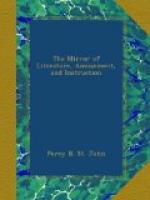This visit shortly took place, not for the object supposed by the community, (who parted with me, even for a short time, with great regret,) but for another purpose. The British ambassador, Lord ——, who had recently arrived at Rio, was a countryman of Father Flynn’s. He enjoyed eminent literary celebrity, was a delightful poet, and well acquainted with the Portuguese language. The superior had no doubt that his own literary and theological merits were equally known to his excellency, whom he visited with a view to negotiating a passage in the British man of war; for he had been called on a secret mission to Ireland, and wished to depart without notifying his intention to the subaltern of the Propaganda. I was not included in the muster-roll of this expedition; but anxious to lose no opportunity of seeing the world, and desirous of beholding the Governor, who had shown his taste and politeness by inviting me to his court, I contrived to nestle myself in the carriage without the superior’s knowledge, and followed his steps to the very ante-room of the embassy. It was too late to send me back; for I was instantly seized by a company of pretty young animals, the very reverse in appearance of the preacher-monkeys of the Propaganda; they all seemed to find in me a kindred soul: my master was ushered into the cabinet, and I was left with my new acquaintance, who were called “attaches,” but whom I at once classed with the secretary-birds,[4] while here and there, I thought, was mingled among them a specimen of the booby, or Pelicanus Sula. Two of these mischievous creatures seemed to delight in tormenting me from mere idleness and ennui, which I bore for some time with great patience, as I saw the boobies pay them much respect. One was called Lord Charles, and the other the Hon. Mr. Henry. I learned these names with facility, and contrived to repeat them, as they had been taught me, by the frequent iteration of one of the boobies.
[3] “Rhodoginus mentions
a parrot which could recite correctly the
whole
of the Apostle’s Creed.”—Animal
Biography, by the Rev.
W.
Bingley.
[4] “The Dutch,”
says Le Vaillant, “give this bird the name of
Secretary,
on account of the bunch of quills behind its
head.”—Bingley,
Animal Biography.




